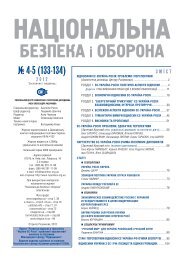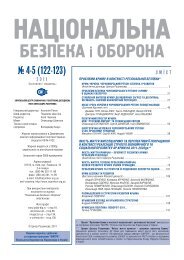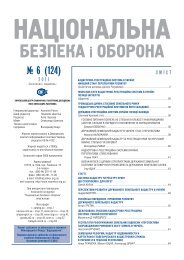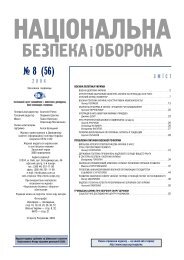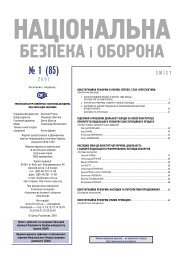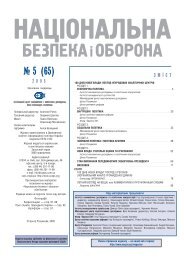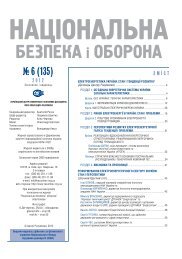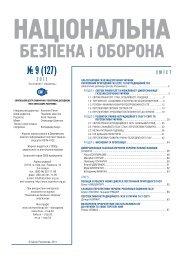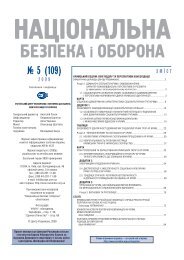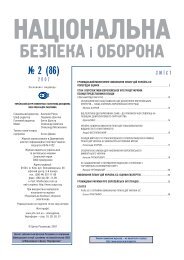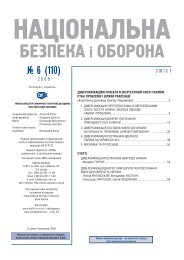RUSSIA THE EURASIAN CUSTOMS UNION AND THE EU COOPERATION STAGNATION OR RIVALRY?
RUSSIA, THE EURASIAN CUSTOMS UNION AND THE EU ...
RUSSIA, THE EURASIAN CUSTOMS UNION AND THE EU ...
- No tags were found...
Create successful ePaper yourself
Turn your PDF publications into a flip-book with our unique Google optimized e-Paper software.
PUBLIC OPINION<br />
Internet as a source of information on the <strong>EU</strong> and<br />
the Customs Union plays an important role for younger<br />
respondents. The role of print media and state radio,<br />
however, decreases as the respondents’ age goes down<br />
(coupled with a growing importance of FM radio stations).<br />
In general, the youngest age group tends to be less<br />
influenced by information coming from TV channels.<br />
In fact, this also shows a general role played by media<br />
in shaping the consciousness of different age groups not<br />
only with regard to the <strong>EU</strong> or the Customs Union.<br />
Factors affecting Ukraine’s accession<br />
to the <strong>EU</strong> and the Customs Union<br />
According to Ukrainians, corruption (80%), low<br />
level of economic development, insufficient pace of<br />
reforms (78%), and problems in the field of democracy<br />
(70%) are the main factors hindering Ukraine’s<br />
integration in the <strong>EU</strong> (Diagram “Do the following factors<br />
hinder Ukraine’s integration in the <strong>EU</strong>?” ).<br />
As regards the difference between the Ukrainian and<br />
European cultural development, such factors as language<br />
barriers and geopolitical (historic, cultural) affinity with<br />
Russia were rarely mentioned (40% and 38%, respectively).<br />
Furthermore, a proportion of those who do not consider<br />
that these factors may hinder Ukraine’s membership in the<br />
<strong>EU</strong> is greater than the proportion of those who do.<br />
According to the majority (53%), only Ukraine’s<br />
integration with the <strong>EU</strong> would hinder Ukraine’s accession<br />
to the Customs Union. A majority of respondents (51-60%)<br />
believe that neither corruption, low level of economic<br />
development, insufficient pace of reforms nor problems in<br />
the field of democracy would prevent Ukraine from joining<br />
the Customs Union. In other words, while there are several<br />
tough requirements standing in the way of gaining <strong>EU</strong><br />
membership, Ukraine’s accession to the Customs Unions<br />
would not require the fulfillment of such requirements.<br />
(Diagram “Do the following factors hinder Ukraine’s<br />
accession to the Customs Union?”).<br />
Targeted policy on the part of Ukraine’s leadership,<br />
however, could play a decisive role in the making of<br />
Ukraine’s final choice on integration. However, citizens<br />
are more prone to believe that in reality the Ukrainian<br />
authorities are not leading the country either towards the<br />
<strong>EU</strong> or to the Customs Union (27%); another 20% are<br />
certain that the authorities are pushing for integration in<br />
both directions; a similar percent of respondents could<br />
not answer this question. Only 22% believe that the<br />
authorities are leading the country to the <strong>EU</strong>, and 10% – to<br />
the Customs Union (Diagram “How do you perceive the<br />
policy pursued by Ukraine’s leadership?”).<br />
Effects of accession to<br />
the <strong>EU</strong> or the Customs Union<br />
Positive expectations prevail among the respondents<br />
when assessing effects of the <strong>EU</strong> integration for<br />
Ukraine: possibility of visa-free travel to <strong>EU</strong> countries<br />
(38%), perfection of the judicial system (26%), access<br />
to advanced technologies, modernisation of enterprises<br />
(23%), access to financial resources for economic<br />
development (22%), enhancement of the rule of law (21%),<br />
reduction of unemployment, creation of new working<br />
places (21%). Negative effects include drain of skilled<br />
manpower to the <strong>EU</strong> countries (24%) and deterioration of<br />
relations with Russia (22%) 7 (Diagram “What effects will<br />
Ukraine’s integration to the <strong>EU</strong> bring for the country?”).<br />
Among positive effects of joining the Customs<br />
Union, the respondents mentioned: unification of the<br />
7<br />
Reported by 20% and more respondents.<br />
fraternal peoples (31%), restoration of disrupted economic<br />
ties, free trade between countries of the Customs Union<br />
(30%), improvement of relations with Russia (23%),<br />
access to cheap energy resources (22%), preservation<br />
of culture, traditions, moral values (21%), discount for<br />
goods and services from Russia, Belarus, Kazakhstan<br />
(20%); among the negative effects: dependence on<br />
Russia, Russia’s influence on internal processes in Ukraine<br />
(31%), a step back in terms of political, socio-economic<br />
development, a return to the USSR (27%). Drifting away<br />
from the <strong>EU</strong> (32%) was another negative impact of joining<br />
the Customs Union (Diagram “What effects will Ukraine’s<br />
accession to the Customs Union bring for the country?”),<br />
considering the fact that an overwhelming majority (67%)<br />
of respondents who gave this answer support Ukraine’s<br />
accession to the <strong>EU</strong> (and only 21% – are against it).<br />
A relative majority of respondents (48%) believe that<br />
Eastern European countries that joined the <strong>EU</strong> have gained,<br />
rather than lost from it (23%). One may assume that this<br />
opinion has also influenced the respondents’ assessment of<br />
possible effects of Ukraine’s accession to the <strong>EU</strong> (Diagram<br />
“Do you agree with the following statements…?”).<br />
When it comes to creation of the Customs Union with<br />
Russia, Belarus and Kazakhstan, a relative majority (37%)<br />
believe that those countries have gained, rather than lost<br />
from gaining membership there (28%). However, far<br />
fewer respondents think that Customs Union members<br />
have gained from joining than there are those who believe<br />
that Eastern European countries which joined the <strong>EU</strong><br />
made the right choice. There is no prevailing opinion as<br />
to whether Ukraine’s accession to the Customs Union will<br />
help it cope with the crisis: 37% of respondents believe so,<br />
36% disagree.<br />
Assessing the effects that Ukraine’s accession to the<br />
Customs Union will have on different aspects of life, a<br />
relative majority of respondents expect positive changes<br />
to the national economy (44%), education, science<br />
and technology (38%), personal income (35%), prices<br />
(34%), unemployment rate (34%). Meanwhile, a relative<br />
majority of those polled expect no positive change to<br />
the environment (41%), efficiency of current leadership<br />
(37%), development of the housing and utilities sector,<br />
roads, infrastructure (34%), and social stratification (33%).<br />
Roughly an equal proportion of respondents reported<br />
positive effect/no effect for the quality of foodstuffs and<br />
negative effect/no effect for democracy and corruption<br />
levels (Diagram “What effects do you expect from<br />
Ukraine’s accession to the Customs Union?”).<br />
Citizens seemed rather sceptical towards prospects<br />
of lower prices on imported gas from Russia:<br />
12% – Russia will significantly reduce the price for a<br />
long period without any additional conditions<br />
20% – Russia will significantly reduce the price in<br />
exchange for Ukrainian gas transportation system<br />
11% – Russia will insignificantly reduce the price only<br />
for a few years and without any additional conditions<br />
24% – Russia will insignificantly reduce the price in<br />
exchange for the Ukrainian gas transportation system<br />
21% – Russia will never reduce the gas price for<br />
Ukraine.<br />
When comparing the conditions in the <strong>EU</strong> and the<br />
Customs Union for Ukraine’s innovative development<br />
and transformation into a country with economic,<br />
social and cultural sector development, 42% of those<br />
polled preferred the <strong>EU</strong> membership, with only 27%<br />
in favour of joining the Customs Union.<br />
RAZUMKOV CENTRE • NATIONAL SECURITY & DEFENCE • №4-5, 2013 • 107



